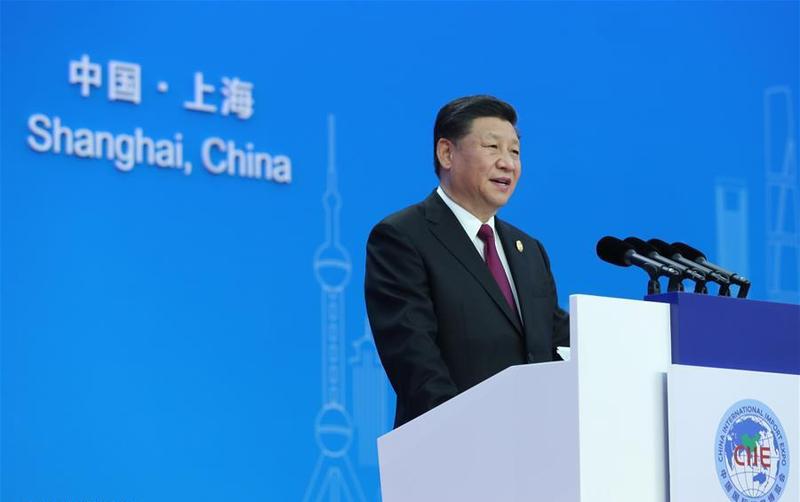
The Washington Post reports: "For 30 minutes on Monday, Chinese President Xi Jinping offered conciliatory promises to political and business leaders from 172 countries gathered in Shanghai: He would turn his country of 1.3 billion into global consumers, welcome foreign investors into previously restricted sectors and crack down on Chinese companies that abuse intellectual property rights. Then, he seemingly turned to an audience of one — his counterpart in the Oval Office — and his tone hardened. 'Great winds and storms may upset a pond, but not an ocean,' Xi said, comparing China to a vast and immovable sea. 'After 5,000 years of trials and tribulations, China is still here. Looking ahead, China will be here to stay.' In his address in Shanghai, closely watched as perhaps the Chinese president's last major speech on trade before he is set to meet with President Trump for crucial talks later this month in Argentina, a confident Xi gave few signs that he was in the mood to make significant concessions. For more than half an hour, Xi hit placating notes, and then steely ones. He made promises to cut tariffs, open up sectors such as health care and education to foreign investment, and import $45 trillion in goods and services over the next 15 years. Then he threw veiled jabs at Trump's leadership style."
The New York Times reports: "One Chinese technology executive said he worked 14 to 15 hours a day at least six days a week. Another said he worked every waking hour and forced himself to watch movies to relax. The reaction from a group of Silicon Valley executives: Wow. 'We're so lazy in the U.S.!' blurted Wesley Chan, a venture capital investor, on the first day of what would be a weeklong journey into the Chinese technology scene. Work habits weren't the only sharp difference between the Valley and China. By the end of the week, a group of American executives and investors found an alternate tech universe. It resembles Silicon Valley superficially. Look closer, and it becomes a futuristic yet closed-off world that can be equally impressive, alienating and dystopian. Chinese technology executives, they found, were even more driven and more willing to do whatever it takes to win. But that comes with major trade-offs, and punishing work schedules are only the beginning. They found Chinese tech executives to be less reflective about the social impact and potential misuse of their technologies, a potentially worrisome quality in a country with loosely enforced privacy laws, strict government censorship and a powerful domestic surveillance apparatus."
The Wall Street Journal reports: "Europe is distracted by internal discord over immigration and its tense relationship with Russia and the U.S. Seeking to fill the void, China is taking advantage of a historic opportunity to wedge itself into the heart of the West. Deal by deal, applying experience honed in Asia and Africa, China is constructing parallel financial and commercial networks in Central and Eastern Europe to challenge the global order. It has taken footholds in more than a dozen nations on the periphery of the European Union. Some, such as Hungary, are smaller, more marginalized members. Others, including Serbia, are on the runway for admission. Chinese workers set a highway through Montenegro's impassable mountains on pillars as tall as a 50-floor skyscraper—part of an emerging corridor of highways, ports and rail lines that outlines a new Chinese trade route between Greece's Aegean coast and Latvia on the frigid Baltic. Chinese technology governs a new international money-transfer system in Serbia. Chinese banks gobbled up a newfangled issue of yuan-denominated bonds from Hungary. Outposts like Košice, Slovakia, are now stops for freight trains from China."
- 2018-11-04 Trump-Xi Trade Deal Is Likely to Begin Rather Than End at G-20
- 2018-11-02 Trump and China’s Xi give positive signs over phone call but markets give up early gains
- 2018-11-01 Australia to Rebuild U.S. World War II Base as China Courts Pacific Allies
- 2018-10-31 Taiwan's UMC halts R&D activities with Chinese semiconductor firm after U.S. ban
- 2018-10-30 China's currency just hit its lowest level in a decade. What's next?
- 2018-10-29 China takes another big step to open its financial markets
- 2018-10-28 Ceasefire in trade war with China bodes well for American business
- 2018-10-26 Shinzo Abe Says Japan Is China’s ‘Partner,’ and No Longer Its Aid Donor
- 2018-10-25 China Mocks Report It Tapped Trump’s iPhone (and Plugs Its Own Competitor)
- 2018-10-24 Japan and China, Asian Rivals, Are Trying to Get Along
- The New York Times Crazy Work Hours and Lots of Cameras: Silicon Valley Goes to China
- The Wall Street Journal China's Newest Bid for Influence Runs Through the West's Backyard
- The Washington Post Xi tells the world China will boost imports while swiping at Trump's 'law of the jungle'
- CNBC China's services sector grows at slowest pace in 13 months as orders dry up, survey shows
- The Washington Post China's Xi promises market opening as import fair begins
- CNBC US-China trade talks will 'go on for some time,' Nobel Prize winner says
- CNN What Sri Lanka's political crisis means for India and China
- Forbes Opening-Up: China's New Central Banker Says 'We're Working On It'
- The Washington Post 2 scholars due to speak at Harvard barred from leaving China
- Financial Times Xi pledges to expand China imports, reduce investment barriers
- Reuters China central bank tests new regulations on Ant Financial, Suning.com
- Forbes Dear Chinese Government, The Democrats Won't Save You
- Foreign Policy In Chinese Spy Ops, Something Old, Something New
- The Washington Post If the Chinese look to the West for a democratic model, what are we showing them?
- The National Interest Big Brother Is Here: Why China's 'Social Credit' Monitoring Tool Should Terrify You
- The Diplomat China Opens First Import Expo With Veiled Warning to Trump
- The Economist America accuses China of stealing aerospace trade secrets
